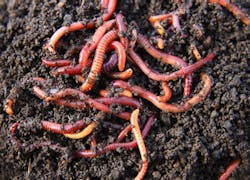Charlotte Douglas International Airport's Worms Permitted to Eat Travelers' Trash
Jan. 09--More than a million hungry worms at Charlotte Douglas International Airport now have a state permit to eat travelers' food waste, after broken equipment and other missteps delayed the centerpiece of the airport's new recycling center for more than a year.
Assistant Aviation Director Mark Wiebke told the Observer that Charlotte Douglas received the composting permit from the N.C. Department of Environment and Natural Resources on Monday.
"That was a nice little hurdle to overcome," Wiebke said. Wiebke added that the airport will begin feeding food scraps from the airport terminal to the worms within the next few days. Their waste -- known as castings -- will be harvested from the raised wooden bins in which the worms live, and spread as fertilizer on the airport grounds.
The composting operation is one of the most ambitious aspects of Charlotte Douglas' recycling center, which opened in June 2012. The Observer reported last month that the facility has been beset by cost overruns and equipment breakdowns since it opened, however.
The recycling center was started as a way to reduce the 10,000 tons of waste Charlotte Douglas sends to the landfill outside Charlotte Motor Speedway every year. Airport officials also hoped to make money back to cover the cost of the $1 million center by selling recyclable goods separated from the trash and making worm compost with food scraps.
A review of public records found the recycling center lost $489,512 last year. The facility cost $536,369 to operate, 28 percent more than initially planned.
The center is run by Cornelius-based contractor Go Green, which handles the day-to-day operations and receives half the center's revenue.
The permit that was required to start composting with the red wiggler worms had been delayed because the airport did not have a required canopy to cover the area outside the recycling center where trash is unloaded.
When Charlotte Douglas starts feeding food scraps to the worms in the coming days, the scraps will first be put through a mixer and a "digester," where decomposition will heat, sanitize and partially break down the food. The partially broken-down food scraps are then spread over the worms, which crawl upward to reach the new food and leave their waste behind for the harvest.
Samples of the worm's waste still must be evaluated by the state for pathogens, Wiebke said. The airport's worm compost permit is good for one year, and Wiebke said he hopes to secure a permanent permit soon.
Wiebke said that broken conveyor belts, which had also stymied the center's operation with frequent malfunctions, have been repaired and are running again.
Last year, the recycling center diverted about 2,500 tons of waste from the landfill, reducing Charlotte Douglas' landfill fees by 24 percent, to $409,546.
Sales of recyclable goods, such as plastic bottles, metal cans and paper, are on track to hit $360,000 this year, up from $270,000 last year, Wiebke said.
Copyright 2014 - The Charlotte Observer
